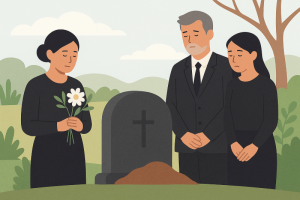A calm, practical guide to choosing and working with a funeral director in the UK
When someone you love dies, planning a funeral can feel overwhelming. A funeral director is there to guide you with care and experience, helping you manage both the practical and emotional side of arranging a service.
This guide explains what funeral directors do, how to choose the right one, what decisions you’ll make, and the questions worth asking.
🌱 At a glance
A funeral director can:
- Arrange collection, paperwork, and the funeral service
- Provide reassurance and guidance
- Liaise with registrars, crematoria, and cemeteries
- Help personalise the funeral with music, flowers, or readings
- Offer aftercare, such as help with ashes, obituaries, or grief support
🤝 What does a funeral director do?
A funeral director supports you through the process of arranging a funeral. They handle logistics and paperwork, and coordinate everything from collecting the person who has died to the funeral service itself.
They often:
- Offer practical and emotional guidance
- Submit required documents to registrars
- Liaise with crematoriums or cemeteries
- Organise transport and viewing arrangements
- Suggest personal touches like music, readings, or flowers
💡 Think of them as a calm organiser at a difficult time — someone who keeps things moving while giving you space to grieve.
📍 How to choose the right funeral director
In the UK, you can choose any funeral director — you don’t have to use the one suggested by a hospital or care home.
✅ Look for trusted accreditation
Choose a director registered with:
- NAFD (National Association of Funeral Directors)
- SAIF (Society of Allied and Independent Funeral Directors)
✅ Ask for a price list
Funeral directors must provide a Standardised Price List. Ask to compare costs and consider what feels affordable for you.
✅ Take your time
Unless there are urgent religious or cultural requirements, you can pause before making decisions.
🧾 What decisions will you need to make?
A funeral director will guide you through choices such as:
- Burial or cremation
- Where and when the service will be held
- Viewings or preparing the person for the service
- Personal touches: music, flowers, clothing, readings
- Budget and payment options
They’ll also handle paperwork, medical certificates, and liaising with the coroner if required.
💬 Questions to ask during your first call
- Are you a member of NAFD or SAIF?
- What’s your price for a simple funeral?
- Can I see a written estimate?
- Do you offer eco-friendly or low-cost options?
- Can I add personal touches (music, readings, clothing)?
🫂 After the funeral
Support doesn’t always end with the service. Many directors also help with:
- Collecting ashes
- Guidance for registering a death
- Placing obituaries
- Linking you to grief counselling or support groups
💡 WithYou Tip
You can meet with more than one funeral director before deciding. The right person will listen without pressure, answer your questions clearly, and guide you with care.
